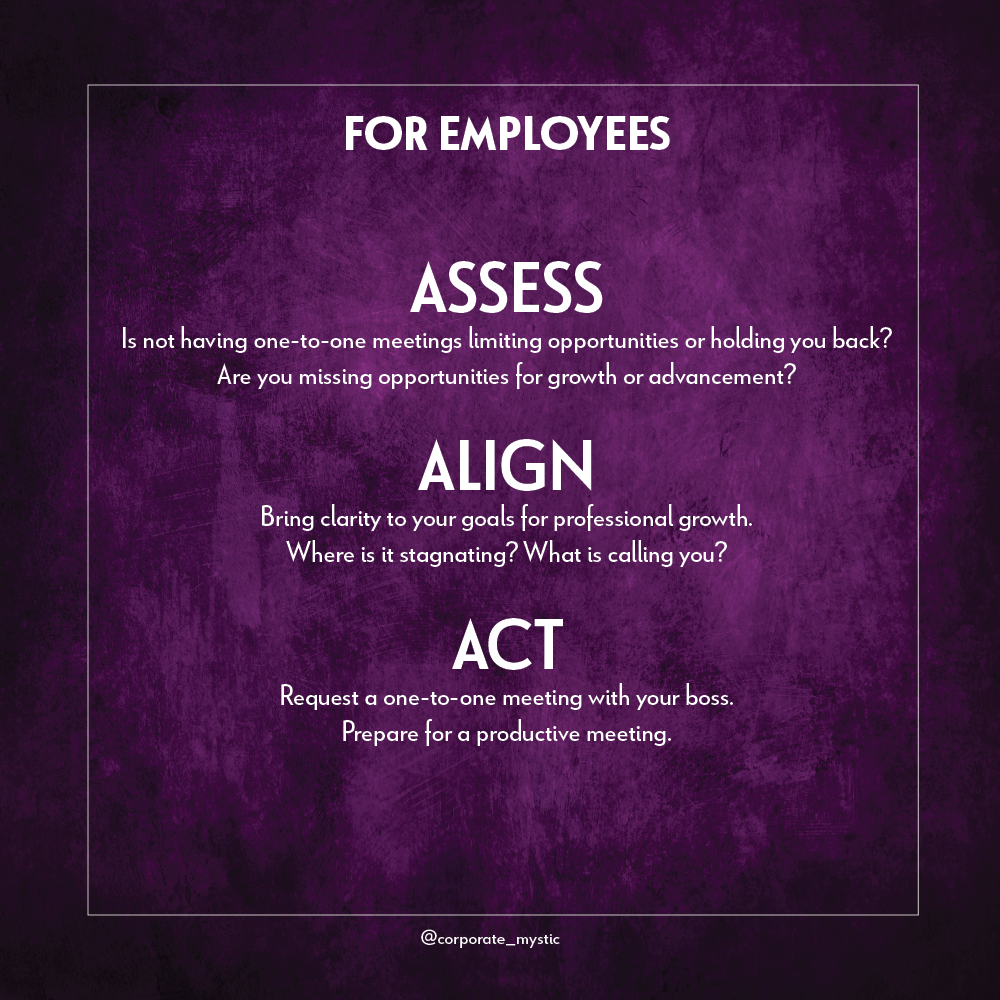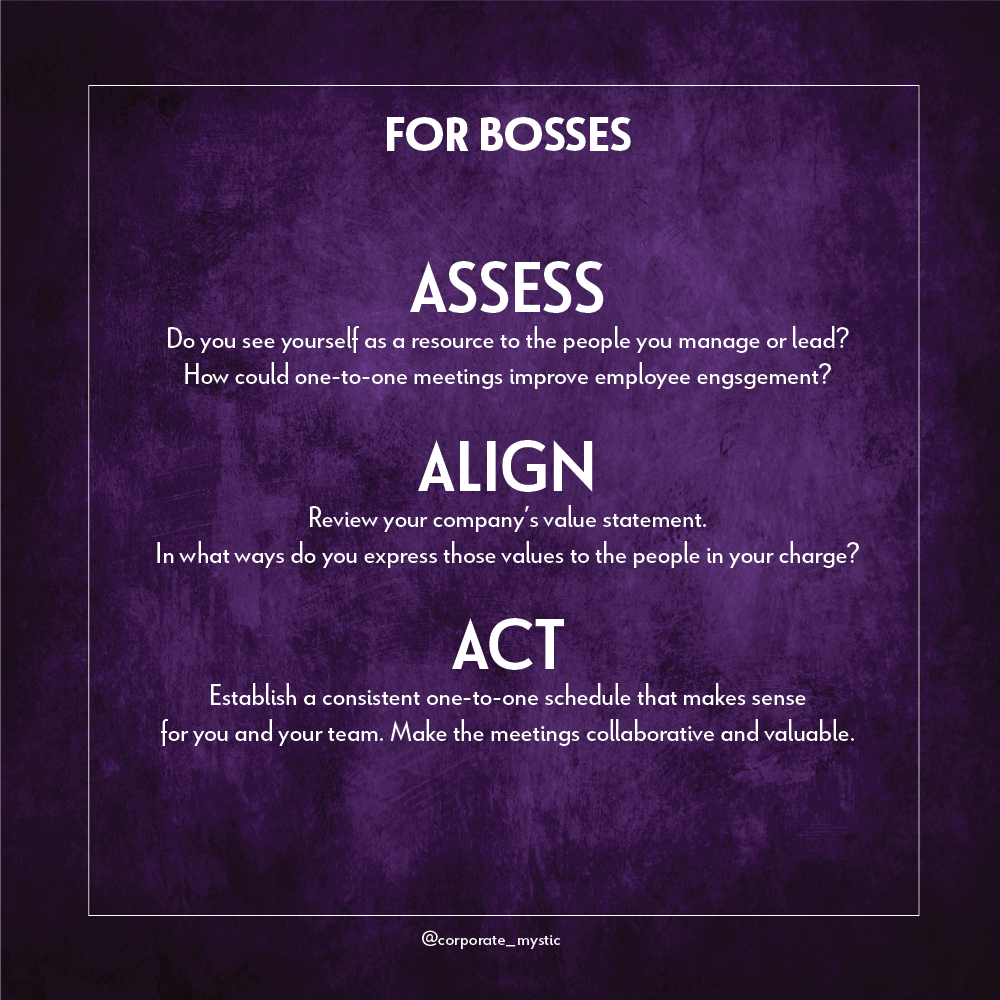Do you run or participate in one-to-one meetings? If you are a boss or an employee, how effective do you think they are? Do you even have them?

When I first began publishing content on social media, fairly early on, I had a viral video. You hear about these things happening, and I have a few friends who legitimately fall into the “social influencer” category. Still, when my video went viral, I admit it was startling to see the instant expansion and feel an immediate connection to so many people. The most surprising aspect of this was the topic that grabbed everyone’s attention: Questions to Ask During Your One-to-One.
It has been republished several times and garnered over 20 million views.
At first, I was surprised because the topic seemed so basic. As an employee, I asked my various bosses these questions. As a boss, my employees would occasionally ask these same questions.
Assumptions and Reactions
These were some of the assumptions that I made when I wrote out the 10 questions:
- Meeting with direct reports was standard practice for most organizations
- One-to-ones are for employee development and engagement
- Managers genuinely care about the success of their employees
- These questions would prompt deeper discussions that could help expand opportunities for career development
Overwhelmingly, I received positive feedback from people, thanking me for providing these questions, and describing how and when they would use them. But there was also a fair amount of feedback that wasn’t positive and provided me with valuable insight. For the less-than-positive responses. There were some specific categories:
- People who claimed never to have had a one-to-one
- People who described one-to-ones as a waste of time
- People who believed that these questions would lead to more work without recognition
- People who didn’t trust management enough to ask any questions
- People who don’t like purple hair. Ok, this last one isn’t important.
“In a healthy organization, one-to-one meetings are an opportunity to build trust.”
Not Corporate Enough
I recognized that many respondents didn’t work in corporate or office environments, which is yet another assumption I held about my audience when writing it. I had to consider if it mattered and if all employees should have an opportunity to meet with their boss or manager. I decided the answer was “Yes.”.
I thought about jobs I held before I entered corporate spaces. Mostly I worked in restaurants, at first fast food restaurants, then eventually higher-end establishments. I worked back of the house, or in the kitchen and reported to the Sous Chef. I had no formal training and to this day I have gratitude for the time my boss took to teach me skills and techniques.
More than that, I was connected to the purpose of my job because everyone from the Chef to the line cook was invested in my success because it supported the overall culture of excellence. The extra time spent to improve my skills didn’t detract from the massive productivity required daily. Quickly, my productivity skyrocketed because I was having so much fun. Don’t misunderstand – it was a hard job. My shift began at 4:30 AM and I was one of only two women in the kitchen. One time I was late for work and the Chef made me dice 30 pounds of onions by hand – three bustubs! I was never late again. The thing was that I loved this job and I felt valued, even if I was the lowest-paid person in the restaurant. My boss took the time to educate and mentor me. I was learning skills that would impact me for the rest of my life. Instead of one-to-ones, this was more like an apprenticeship, where more experienced and skilled people passed on their knowledge to a new generation of workers. This made me wonder why we don’t do this in general.
I wanted to dig deeper into the frustration and see what I could reveal and learn.

The Never Haves
“I’ve Worked Here for over 9 Years and Never Had a One-to-one Meeting”
This is an actual quote from a person I gave a free consultation. It echoes many statements I’ve heard or seen about people’s professional experiences. The longest I saw someone posted is 20 years. I don’t always have insight into what these individuals do professionally or their work environments. When I have had an opportunity, I ask and receive mixed feelings about it. Some people seem lost as if they were trapped and captured into this endless position they can’t escape. When I ask about possibilities for growth or opportunities that excite them, there are none.
The best case in this scenario is the person is apathetic and not very attached to their career identity. They work for a paycheck and otherwise enjoy their lives. Unfortunately, this isn’t the case for many people I speak with. Instead, I hear anger and frustration about things seemingly beyond their control. When I ask why they don’t change their reactions or the situation, they immediately say they have no options. I asked one person how long they had felt this way and they answered “More than 7 years.” It is difficult to measure how diminished a person in this scenario can become and in my experience, it gets exponentially worse over time.
The Waste of Times
Most people who describe their one-to-one meetings as a “waste of time” are actually telling me what they think about the boss. That is their boss offers them no value. When the meetings happen, they are being used in all the wrong ways and are wasting the employee’s time. These are some of the ways that time is wasted in a one-to-one meeting:
- The boss does all the talking, usually about themselves or co-workers
- The meeting is used for discipline or only for negative feedback
- The employee is being micromanaged and is never given valuable support
In all of these scenarios, the one-to-one is wasting everyone’s time. People I speak with tell me they just want to do their jobs and in many cases, these meetings create unnecessary work, instead of alleviating stress, which leads to the next response.

Not Going To Fall For That
Frequently, I see comments or have been told that asking questions in a one-to-one meeting is a definite way to get more work without recognition. Questions that I saw as opportunities for professional growth, such as “Is there anyone I should be collaborating with or supporting?” were seen by some differently. They described environments where management would take unfair advantage of that kind of offer, and instead of an opportunity, it would become overwhelming. Some of my greatest growth experiences came from collaborating with other teams and solving mutual challenges. These experiences led to incredible opportunities and success. But, in most cases, I had a supportive boss or workplace culture that allowed me to flex and take risks. Or maybe I did that no matter what.
We Don’t Trust You Either
The last vocal group is simply stated. They don’t trust management and even if they have one-to-one meetings, they are silent and wait for them to end. Studies show how much of an impact poor management has on everything from an employee’s health to overall business productivity. Let me be the first to say that if your employees don’t trust you it is because they know that you don’t trust them. Relationships without trust are unsustainable, making this a critical retention issue. In a healthy organization, one-to-one meetings are an opportunity to build trust.
A Learning Mind
In fairness, nearly all the people I have spoken to or met with have agreed that they were never taught how to run or participate in an effective one-to-one meeting. So, many of us make it up as we go and often unintentionally recycle bad habits. Some seem naturally inclined, which is great, but this can be learned. No matter where you fall on that broad spectrum — if you are a boss who holds one-to-ones or an employee who attends them — we can all learn ways to improve the experience. I agree that meetings that aren’t purposeful and productive should be avoided. But there is value in building relationships and developing meaningful connections. There is value in understanding and developing employees at all levels of an organization.
Do you want to continue your leadership growth journey? Look for the pop-up on my site and join the waitlist for the Infinity Leadership Community, launching in 2025. More details are coming soon!!
With joy,
Stephanie
Resources:




